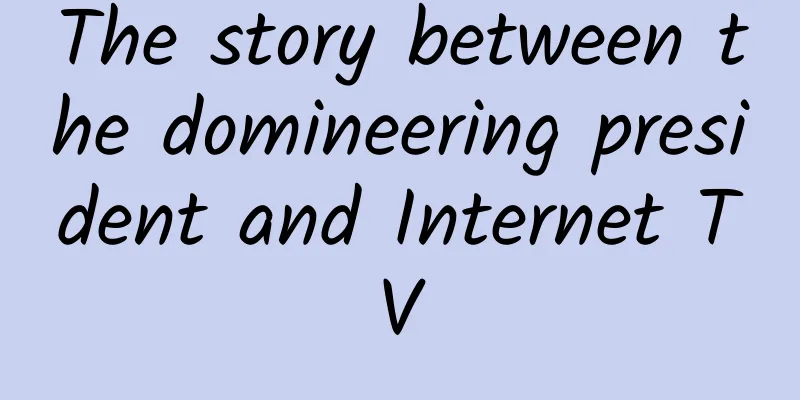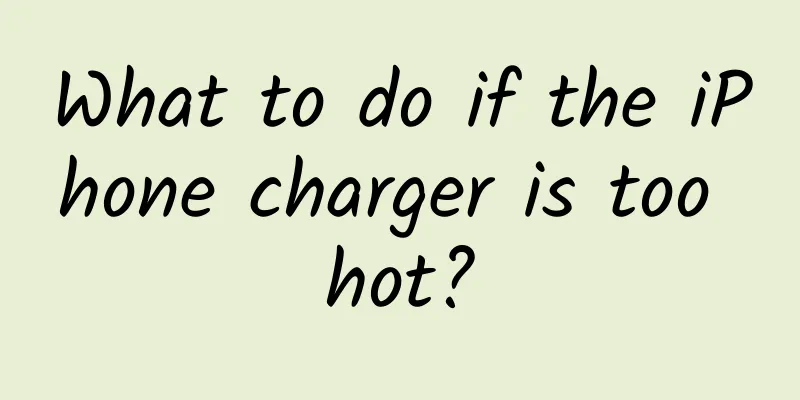The story between the domineering president and Internet TV

|
The story of radio and television is always long, complicated and lost. On July 7, the State Administration of Press, Publication, Radio, Film and Television issued an urgent notice to the seven major licensees, requiring them to rectify the existing violations in Internet TV. It can be said that these violations cover most Internet TVs and box products. The fundamental purpose is to completely close all video-on-demand entrances except the broadcast control platform . Up to now, the SARFT officials, licensees and Internet content service providers have not given Leifeng.com an accurate response. In the process of unraveling the truth, we tend to believe that the source of this news has been exaggerated. However, there is no doubt that Internet TV supervision will be normalized, tightened and the gray area will be compressed. Going back further in time, when Xiaomi and LeTV were in the midst of a quarrel, Xiaomi brought out the State Administration of Radio, Film, and Television to calm the situation, claiming that LeTV TV did not reflect cooperation with the licensee. The comments in the industry at the time were quite interesting. Some people thought that Xiaomi's practice was not decent; some people felt that Xiaomi's cooperation with more than one licensee was a violation of regulations; others thought that this was really "why both sides are so anxious to fight each other"... In any case, there is a key piece of information here. Xiaomi and LeTV are based on, or subvert, the "Radio and Television Document No. 181" which has made the Internet TV industry famous. It's a dry and irritable day, which is suitable for listening to stories quietly. Let's talk about the past and present of Document No. 181. What was the TV market like before “Document No. 181”?When cable TV and home broadband were still two separate services (about a dozen years ago), paying cable TV fees allowed you to watch TV content, which was under the jurisdiction of the State Administration of Radio, Film and Television; while broadband Internet access, browsing multimedia content through the Internet, was under the jurisdiction of the Ministry of Industry and Information Technology. As time went by, with the development of the Internet , the two big brothers gradually began to "closely contact". The rise of the three-network integration and the emergence of Internet-connected TVsThe development of the Internet, especially the gradual increase in broadband networks, has led to the rise of video websites, which have become a channel for people to obtain information and entertain themselves. In 2010, the policy of three-network integration was introduced. At this stage, the power of the State Administration of Radio, Film and Television was touched. In addition to China Telecom, which has launched IPTV services in some regions, there are already TV terminal manufacturers who have tried to use the networking function of TV terminals to deploy front-end service platforms and form end-to-end services. During this period, the card-machine separation technology began to be partially applied. However, at this time, Internet TV is mostly a concept, and the capabilities of relevant stakeholders, including TV manufacturers, are not as good as those of traditional TV stations and cable networks. There is still a significant difference between "watching videos on a computer" and "watching TV"; at this time, most Internet videos are on-demand, and their influence and coverage are incomparable to those of TV content. Therefore, at this time, Internet video content is still under the jurisdiction of the Ministry of Industry and Information Technology, and you only need to apply for an "Internet Audiovisual Content License" to run a video website. However, TV boxes and smart TVs appearedIn January 2010, Google produced its first Android phone, Nexus One. After that, the Android system gradually became popular, and TV companies also found a better tool. Due to the open source and free of charge of Android and the rapid follow-up of developers, the TV product form has an opportunity to upgrade from the original end-to-end "independent play" to platform operation. Video websites and various applications can be loaded on TVs through APK development. Set-top boxes with Android operating systems have also begun to appear, and TVs have evolved from Internet-connected TVs to smart TVs, with a much better experience than previous Internet TVs. This also means that the State Administration of Radio, Film, and Television and the Ministry of Industry and Information Technology can no longer distinguish between you and me. In 2011, the General Office of the former State Administration of Radio, Film and Television issued the "Operation and Management Requirements for Institutions Holding Internet TV Licenses", also known as Document No. 181, which regulates the business, content and operation of Internet TV. For example:
In short, the general principles are: If the Internet wants to integrate with television, it must cooperate with the above seven companies. Failure to cooperate is illegal, and illegality must be taken down. Following repeated orders, in 2014, all boxes and smart TVs on the market began to shut down their live TV content services, and manufacturers began to cooperate with only seven broadcast control platforms. In this way, the radio and television only needs to manage seven broadcast control platforms, and the management effectiveness can cover the entire Internet TV industry. In addition, it is worth noting that the charm of Document No. 181 lies in that in the long years since then, Document No. 181 has repeatedly returned to people's horizons and continued to ferment. In this regard, Leifeng.com's reporter commented that it had a certain effect of combining dredging and blocking at the time, but now, haha. Those were the wild days of Internet TVFrom the issuance of Document No. 181 in 2011 to 2013, Internet TV entered a wild period. ah. As Internet speeds continue to increase and the performance of mobile phones and tablets continues to improve, it is becoming more and more convenient for people to watch videos through the Internet. In terms of hardware, any mobile phone or tablet can be connected to a TV to watch videos. In terms of software, various video websites can play the same programs as TV by buying out the resources of TV stations, and even launched live broadcast services. Since then, a large number of TV users have turned from radio and television networks to the Internet. LeTV and Xiaomi's smart TVs and boxes began to be launched on the market, and September 2013 became the launch month for smart TVs. What’s more amazing is that copycat boxes have emerged in full swing, and even became the main force in the shipment of Internet TV set-top boxes in 2013, accounting for more than 80%. Many of these copycat boxes have no relevant authorization in terms of software and hardware, and no copyright authorization in terms of content. Some even set up their own servers or steal links, providing live streaming prohibited by Document No. 181, channels that spread overseas or even pornographic content. In 2013, the shipment volume of all Internet TV set-top boxes reached tens of millions, but less than 20% of them cooperated with the license holders. Document No. 181 was originally just a regulatory document of a ministry, and during this process, the State Administration of Radio, Film, and Television and the General Administration of Press and Publication were merging after the two sessions, so the counterfeit boxes grew wildly during this time window.
NOW Radio and Television has already seized the real power to manage Internet TVIn 2014, mainstream media reported that a new version of the "Internet Information Service Management Measures" would be issued soon, revising the "Internet Information Service Management Measures" promulgated in 2000, with the document number being State Council Order No. 292. The report pointed out:
Zeng Huiming, CEO of China Broadcasting Network, pointed out that the core of the revision of Order No. 292 should be to characterize and classify Internet TV as a radio and television business. In the "game of power" with the Ministry of Industry and Information Technology in the field of Internet TV, the State Administration of Radio, Film and Television has already seized real power.
Since then, the State Administration of Radio, Film and Television has issued a series of "Supplementary Notice on Further Improving the Management of Online Audiovisual Programs such as Online Dramas and Microfilms" (No. 2, 2014) and "Notice on Further Implementing Relevant Regulations on the Management of Online Foreign Films and TV Dramas" (Xinguangdianfa [2014] No. 204), which have made a series of regulations (and restrictions) on the content of Internet videos. And various new notices reiterating Circular 181, such as: On June 23, 2014, the State Administration of Radio, Film and Television issued a "Notice on Immediately Closing Illegal Video Software Download Channels in Internet TV Terminal Products" based on "Document No. 181" which states that "Internet TV terminal products shall not have other channels to access the Internet and shall not be connected to the relevant management systems and databases of network operators"; On July 4, 2014, Luo Jianhui, director of the Network Audiovisual Program Management Department of the State Administration of Radio, Film and Television, said that Internet TV integrated business licenses would no longer be issued; On July 9, 2014, in order to ensure that Internet TV content service agencies should comply with the publicity management requirements consistent with radio and television in "Document No. 181", the State Administration of Radio, Film and Television required that the smart TV set-top boxes and other terminals purchased or integrated, developed and installed by cable network companies should not be installed with any operating system other than TVOS; On July 11, 2014, the SARFT issued a document based on Document No. 181, which states that “at the current stage, Internet TV content services mainly provide users with video on demand and graphic information services”, requiring some OTT TV integrated broadcast and control platforms to cancel the time-shifting and playback functions of TV programs directly provided on the integrated platforms. For a time, the sales growth of the boxes slowed down, various illegal programs were removed from the shelves, video apps were suspended, and third-party application stores were facing closure... Since 2014, all boxes and smart TVs on the market have begun to shut down their live TV content services. Manufacturers have begun to cooperate with seven broadcast control platforms that have radio and television licenses. Major video platforms have also removed their original TV version APPs, and channels have begun to tighten. Is this the end of it? No.Since the tightening of policies, the solutions that have emerged in the market can be roughly divided into the following categories:
The first way is more like destroying one's own strength, using a slightly expensive smart TV as a monitor, which loses the meaning of intelligence; the third way is slightly risky, after all, it is illegal! Only the second way takes advantage of the loophole. If this policy adjustment is true, it will also block this path. All content acquisition for boxes and smart TVs can only be completed through the pre-installed system at the factory, which truly realizes the tightening of supervision. Is this the end of the matter? No.At 8:33 am on June 10, 2015, the Legislative Affairs Office of the State Council posted on its website the "Notice of the State Administration of Press, Publication, Radio, Film and Television on Soliciting Public Opinions on the Draft for the Revision of the Measures for the Administration of Audiovisual Programs Disseminated on the Internet and Other Information Networks (Revised Draft for Soliciting Comments)", soliciting public opinions until June 30. The new policy's provisions on Internet TV are basically consistent with those in Document No. 181. But there are 2 new regulations: First, all television stations at the municipal level and above can apply for Internet TV content service licenses. Previously, only 14 television stations at the provincial level and above had OTT content service licenses. It seems that the scope of issuance of content service licenses will be expanded. Second, TV stations at or above the provincial level can apply for integrated service licenses, but the national market will not accommodate many OTT integrated broadcast and control licensees. The current seven are too many. According to Director Luo’s speech, where the capability is, the policy is there. Internet TV licenses may be dynamically managed. Licensees that do not meet the requirements may be delisted, and TV stations with good performance can obtain licenses. (The most golden integrated broadcast and control licensee has introduced a competition mechanism. The game between the seven princes and the power behind them is also a very rich story. I will discuss it in detail next time.) In addition, the most important part of the new policy is that new mobile video policies will be introduced, and commercial video websites are not eligible to apply for content licenses or integrated broadcast control licenses. All commercial video websites that are currently providing mobile video services are in violation. Once the policy is implemented, all commercial video websites and mobile video apps will face the fate of being removed from the shelves and shut down. (Don't scare me, I'm not well educated) You should know that mobile videos on commercial video sites have maintained rapid development in recent years, with mobile traffic accounting for more than 50% and 60%, and commercial revenue accounting for 40% (Youku). So, you see, radio and television have always monopolized the market, and the real storm may still be brewing. As a winner of Toutiao's Qingyun Plan and Baijiahao's Bai+ Plan, the 2019 Baidu Digital Author of the Year, the Baijiahao's Most Popular Author in the Technology Field, the 2019 Sogou Technology and Culture Author, and the 2021 Baijiahao Quarterly Influential Creator, he has won many awards, including the 2013 Sohu Best Industry Media Person, the 2015 China New Media Entrepreneurship Competition Beijing Third Place, the 2015 Guangmang Experience Award, the 2015 China New Media Entrepreneurship Competition Finals Third Place, and the 2018 Baidu Dynamic Annual Powerful Celebrity. |
<<: IT Industry Trend Report: Current Status of the Global Intelligent Robot Market
>>: New economy, new momentum: Alibaba Research Institute interprets the government work report
Recommend
Want to lose belly fat? Choosing the right exercise time can double the effect!
On the road to losing weight, many friends are to...
A milestone product, PICO 4 shoulders the historical responsibility of popularizing all-in-one VR headsets
As a VR player, I have been tracking the developm...
With 3 million new users in 4 months, how to use data to drive the growth of mini programs?
This article shares specific cases of mini progra...
Why can iPhone 5 still compete? Why are Snapdragon 800/801 phones unable to get Android 7.0?
Android phones are updated so quickly that every ...
Using apt in Android Studio
1. Introduction Are you still blindly copying and...
Is the national pride behind the Chinese buyers' show coming a little too early?
Chinese people's "explosive buying"...
China Passenger Car Association: Passenger car retail sales will reach 2.622 million units in December 2024, with new energy vehicles accounting for more than 50%
The latest sales data from the Passenger Car Asso...
The mobile phone market is saturated and needs to be transformed. HTC wants to make a comeback with VR?
On April 26, the virtual reality device HTC VIVE ...
Drones are still a niche toy industry or may usher in a blue ocean era
There is a question on Zhihu, an online Q&A c...
Is drinking soup really unnutritious?
A few days ago, a nutritionist on a health progra...
6000 words to explain the underlying logic of operations
I believe that many of my friends will feel that ...
Why is it difficult for domestic apps to dominate overseas markets?
[[137790]] China is the most populous country in ...
If you drink too much, can honey water help you sober up? There are also some foods that you should not eat when drinking.
You can't drink on an empty stomach. I guess ...
Xiaohongshu 618 Marketing Preparation Strategy
The situation varies from brand to brand, so the ...
Zhu Xian audiobook, Zhu Xian audiobook Beiming audiobook Baidu cloud!
Zhu Xian audiobook, Zhu Xian audiobook Beiming au...









